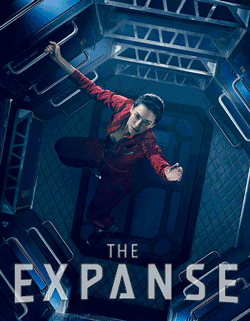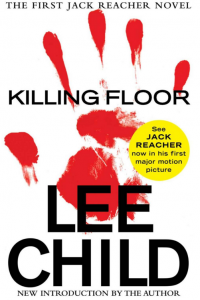The Expanse: Premier
 Nicely done. I’ve been waiting for the SyFy channel’s adaptation of James S. A. Corey’s Expanse novels with a lot of anticipation and a certain amount of anxiety…could the makers of Sharknado do justice to what’s probably the best hard sf / space opera written in the last twenty years?
Nicely done. I’ve been waiting for the SyFy channel’s adaptation of James S. A. Corey’s Expanse novels with a lot of anticipation and a certain amount of anxiety…could the makers of Sharknado do justice to what’s probably the best hard sf / space opera written in the last twenty years?
The answer is absolutely. The story follows the first novel, Leviathan Wakes, and it does it with minimal paring down of the scenes and characters. You can’t fit an entire novel into a movie format, even if it is ten hours long, the length of the first season, but they’ve managed to be true to the story without being handcuffed to it.
The production values are as good as anything you’ll see on the big screen, with the possible exception of the sound mixing. The voice audio is muddy in places, typically when we’re listening to suit radios or Belter patois. The book has the advantage of everything being clear, but in space, no one can hear you talk. This may be by design, just as Kubrick’s sterile 2001 feel was done to evoke a sense of alienation, they’re using it to establish that this is an environment with a high noise to signal ration…and you’re got to work at it. Fortunately it’s worth the effort. Besides, you can turn on the subtitles. Too bad that they don’t include the comments in Belter lingo, which just say “Belter Creole.”
George R. R. Martin was quoted on the book jacket saying it’s the best space zombie book he’s ever read, and while that comment gets a bit ahead of the first episode, it’s clear that the whole thing has a deliberately Game of Thrones in Space vibe. Earth, Mars, and the Belters form an unstable compound and we’re just waiting for the catalyst to show up.
And it will.
If you thought the freighter in Aliens was gritty, you haven’t seen the interior of the Canterbury, which comes off as completely authentic in its scarred and beat up way. So does the interior of Cere’s and all together they’ve done an impressive job not just with Zero G effects, but with selling the fact that gravity isn’t just on or off, it’s all over the place depending on what’s going on. Maybe you’re growing up in a little gravity, maybe you’re about to be mashed into your seat by an emergency burn. Depends.
I wasn’t sure about Thomas Jane as Miller, the burned out detective, but I’m totally good with it. An older Miller was my first reaction when I saw the trailers, but Thomas Jane is making the part his own and doing a very nice job of it. The adaptation of a book depends on both the writing and the chemistry of the cast to sell it, and having seen the first episode I’m actually happier with the feel it’s got than the one that I conjured up in my mind’s eye reading the books. My characters were all a bit too predictable, and theirs have just enough dissonance to surprise me into seeing it all again for the first time.
Holden played by Steven Strait, Namoi by Dominique Tipper and everyone else, I’m good with it.
This isn’t the book, and it will have its own vibe, although I’m starting to feel it overwrite my internal notions of who everybody was from reading the series. Fortunately, Jason F. Brown (Exec Prod) have done a solid job bringing The Expanse to life. To have wasted such a good story would have been criminal.
Hang on. It’s going to get bumpy in the episodes ahead.
Enter Jack Reacher – A Look Back at The Killing Floor
 Jack Reacher. I don’t figure you need me to explain who Jack Reacher is at this point. If nothing else you’ve probably seen Tom Cruise play him in the movie. Which I liked pretty well, despite the fact that Cruise isn’t close to Reacher’s 6 foot 5 inches and that Cruise brought a somewhat sanitized version of Reacher to the screen. He might have claimed that his character didn’t worry about niceties like rules when it came to self-defense, but once you’ve actually read the book you’ll see that he was pulling his punches compared to the literary version.
Jack Reacher. I don’t figure you need me to explain who Jack Reacher is at this point. If nothing else you’ve probably seen Tom Cruise play him in the movie. Which I liked pretty well, despite the fact that Cruise isn’t close to Reacher’s 6 foot 5 inches and that Cruise brought a somewhat sanitized version of Reacher to the screen. He might have claimed that his character didn’t worry about niceties like rules when it came to self-defense, but once you’ve actually read the book you’ll see that he was pulling his punches compared to the literary version.
Killing Floor was Lee Child’s first Jack Reacher story, and it was a terrific debut novel 18 years ago. Having just read it again I’m happy to report that it’s just as good today. Continue reading
TechnoPagan Blessing for a Leatherman
I call upon the earth, its iron given to forge this Tool,
I call upon the hacker spirit, driving us to explore, understand, improve, and create,
I call upon the Goddess, mother of the twins we serve, nature and technology.
Blessed be this Tool,
May it help its owner through adversity,
May it provide the abilities that would otherwise be lacking,
May its blades remain sharp, its pliers strong, and its steel untarnished,
May it serve long years, not failing before its tasks are complete.
Bless that it never be used to wantonly destroy,
May its implements be used as they are able, not forced into roles they cannot fulfill,
May its pliers not pinch living flesh, nor blades cut it, nor it’s saw be applied to bone, except in emergency field operations, as required by such dire exigencies.
May it be used to strive against entropy, to build up more than to take apart.
Let us strive to be as this Tool, strong, capable, flexible,
With a wealth of hidden abilities to call upon when needed.
Blessed be this tool,
May it be used in the service of the Goddess.
[anoint Tool with lubricating oil]
SFRevu / Linda Nagata Interview
 SFRevu: The Red: First Light was your first sf novel after a considerable hiatus, but you came out swinging, and it grabbed a Nebula nomination right off the bat. Then of course it caught the attention of Simon and Schuster. So, a couple of questions come to mind. First, what took you so long to get back to sf? And how do you think the time spent away affected you as a writer?
SFRevu: The Red: First Light was your first sf novel after a considerable hiatus, but you came out swinging, and it grabbed a Nebula nomination right off the bat. Then of course it caught the attention of Simon and Schuster. So, a couple of questions come to mind. First, what took you so long to get back to sf? And how do you think the time spent away affected you as a writer?
Linda Nagata: I stopped writing science fiction in large part because there seemed no point to it. Though my work had done well critically, I’d failed to connect with enough readers to sustain a career. At the same time, a lot of popular SF failed to connect with me. So I moved on to other things. I didn’t entirely quit writing, though it was close. But once a writer, always a writer. After I self-published my backlist, I started writing original fiction again, starting in fantasy because that made it a fresh start for me, completely different from anything I’d done before. I wrote a short secondary world fantasy novel called The Dread Hammer—a dark and darkly humorous look at love, war, murder, and marriage. I had a lot of fun with it, and proved to myself that I could still write. At that point, one of my long-time readers urged me to take up short fiction again—science fiction—and that went well. In fact, The Red arose directly from two of the short stories I wrote during this period. Continue reading